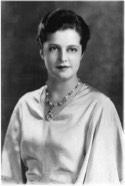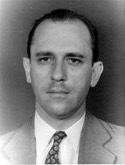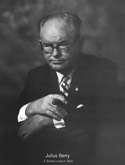Avent - Person Sheet
Avent - Person Sheet
Misc. Notes
”Mimi"
Emily instilled in all around her, her love for knowledge and her pleasure in the written word. And though she lost two husbands she left a legacy of the true joy of laughter and a sense of humor.
When Emily "saved" Julius from eternal bachelorhood, she was new to Tupelo but immediately she joined in the community tradition of service. "Mimi" served as president of the Women of the Church, the Tupelo Junior Auxiliary and as president of the Saturday Reading Club. She also was a director of the Tupelo Community Concert Association and was an active member of the Salvation Army Auxiliary, the Daughters of the American Revolution, the League of Women Voters, and the Junior League of Memphis.
Beside the church it was the Lee County Library though which seemed to be a major focus in her life. The circulation desk got to know Emily very well because she was an avid reader, checking out as many as five to six books a week and keeping ahead of her was challenging at best at times. She also used the reference desk often when researching for a talk or paper and would donate books to the library for the benefit of others. Emily was a true patron of the library in every sense because she knew the value that such an institution gave to the community and how it could help strengthen the minds of all, especially the children.
Emily graduated from Miss Hutchinson’s School of Memphis and attended, 1929-1931, Southwestern College (now Rhodes) of Memphis. She was a member of the Chi Omega Sorority, the Girls’ Cotillion Club, the Royal Club (pass member of the Memphis Cotton Carnival Court, its royalty and ex-presidents) and the Junior League of Memphis.
Emily instilled in all around her, her love for knowledge and her pleasure in the written word. And though she lost two husbands she left a legacy of the true joy of laughter and a sense of humor.
When Emily "saved" Julius from eternal bachelorhood, she was new to Tupelo but immediately she joined in the community tradition of service. "Mimi" served as president of the Women of the Church, the Tupelo Junior Auxiliary and as president of the Saturday Reading Club. She also was a director of the Tupelo Community Concert Association and was an active member of the Salvation Army Auxiliary, the Daughters of the American Revolution, the League of Women Voters, and the Junior League of Memphis.
Beside the church it was the Lee County Library though which seemed to be a major focus in her life. The circulation desk got to know Emily very well because she was an avid reader, checking out as many as five to six books a week and keeping ahead of her was challenging at best at times. She also used the reference desk often when researching for a talk or paper and would donate books to the library for the benefit of others. Emily was a true patron of the library in every sense because she knew the value that such an institution gave to the community and how it could help strengthen the minds of all, especially the children.
Emily graduated from Miss Hutchinson’s School of Memphis and attended, 1929-1931, Southwestern College (now Rhodes) of Memphis. She was a member of the Chi Omega Sorority, the Girls’ Cotillion Club, the Royal Club (pass member of the Memphis Cotton Carnival Court, its royalty and ex-presidents) and the Junior League of Memphis.
Spouses
1AVENT, Dr. Charles Harold M. D. 
 , 5G Grandson
, 5G Grandson

 , 5G Grandson
, 5G GrandsonBirth Date10 Jun 1908
Birth PlaceKerens, Navarro County, Texas
Death Date15 Feb 1948 Age: 39
Death PlaceMemphis, Shelby County, Tennessee
FlagsServed in the Military, Slave Owner, World War II
FatherAVENT, Charles Kirk (1877-1952)
MotherMILLER, Maude (1880-1945)
Misc. Notes
Harold Avent received a A.B. degree at Southwestern College-Memphis (now Rhodes) where he was president of both his Senior Class as well as the Lynx Club, a cheerleader for all four years and a member of the Kappa Alpha fraternity. He was inducted into the honorary society of Omicron Delta Kappa (ODK) on April 23, 1929.
In 1932 Harold received his M.D. degree from the University of Tennessee Medical School. He interned at Gallinger Hospital in Washington, D.C. and both the Ruptured and Crippled Hospital and the 5th Avenue Hospital in New York City and was a resident surgeon at John Gaston Hospital in Memphis specializing in general surgery as well as a member of the staff of Baptist Hospital.
He joined the Army Medical Corp June 25, 1942 as a Captain and was assigned to the Third Auxiliary Surgical Group at San Antonio, Texas. On December 8, 1942, he sailed for England on the Queen Mary.
NOTE: In December 1942, Queen Mary carried 16,082 American soldiers from New York to Great Britain, a standing record for the most passengers ever transported on one vessel. During this trip, while 700 miles (1,100 km) from Scotland during a gale, she was suddenly hit broadside by a rogue wave that may have reached a height of 28 meters (92 ft).
He served as chief surgeon of the 44th Evacuation Hospital during the European Campaign and had also served in Northern Africa, Sicily and Italy before being transferred to the 44th in March of 1944 where he was made Chief of Surgery. The 44th Evac Hospital, located in Malmedy, was almost captured during the Battle of the Bulge in December of 1944. The 44th Evacuation Hospital was attributed with “doing a magnificent job” in attempting to save emaciated slave laborers freed at the Nordhausen, Germany, V-Bomb Plant.
He was awarded the Bronze Star for meritorious service while in Europe from June 19, 1944 through September 22, 1944. His citation was for “the rapid organization and setting up of his hospital which enabled it to render immediate and efficient medical service to large numbers of servicemen and for his outstanding professional judgement and skill”.
He was discharged in October 1945 as a Lieutenant Colonel. He was described by one of his fellow officers as "...the type that suffered quietly; he never complained. He returned to his surgical practice in Memphis where he died two and a half years later at the age of thirty-nine.
He was a member of the Military Order of World Wars and the University Club and was active in the Idlewild Presbyterian Church."
NOTE: In an interview on 03/26/95 by Robert Avent of Josephine Miller— the first cousin of Dr. Avent—she described Harold as “cocky and spoiled” though everyone seemed to like him. His self-confidence probably came from the fact that at a very young age he knew he wanted to be a physician and was therefore very focused and self-assured throughout his life.
In 1932 Harold received his M.D. degree from the University of Tennessee Medical School. He interned at Gallinger Hospital in Washington, D.C. and both the Ruptured and Crippled Hospital and the 5th Avenue Hospital in New York City and was a resident surgeon at John Gaston Hospital in Memphis specializing in general surgery as well as a member of the staff of Baptist Hospital.
He joined the Army Medical Corp June 25, 1942 as a Captain and was assigned to the Third Auxiliary Surgical Group at San Antonio, Texas. On December 8, 1942, he sailed for England on the Queen Mary.
NOTE: In December 1942, Queen Mary carried 16,082 American soldiers from New York to Great Britain, a standing record for the most passengers ever transported on one vessel. During this trip, while 700 miles (1,100 km) from Scotland during a gale, she was suddenly hit broadside by a rogue wave that may have reached a height of 28 meters (92 ft).
He served as chief surgeon of the 44th Evacuation Hospital during the European Campaign and had also served in Northern Africa, Sicily and Italy before being transferred to the 44th in March of 1944 where he was made Chief of Surgery. The 44th Evac Hospital, located in Malmedy, was almost captured during the Battle of the Bulge in December of 1944. The 44th Evacuation Hospital was attributed with “doing a magnificent job” in attempting to save emaciated slave laborers freed at the Nordhausen, Germany, V-Bomb Plant.
He was awarded the Bronze Star for meritorious service while in Europe from June 19, 1944 through September 22, 1944. His citation was for “the rapid organization and setting up of his hospital which enabled it to render immediate and efficient medical service to large numbers of servicemen and for his outstanding professional judgement and skill”.
He was discharged in October 1945 as a Lieutenant Colonel. He was described by one of his fellow officers as "...the type that suffered quietly; he never complained. He returned to his surgical practice in Memphis where he died two and a half years later at the age of thirty-nine.
He was a member of the Military Order of World Wars and the University Club and was active in the Idlewild Presbyterian Church."
NOTE: In an interview on 03/26/95 by Robert Avent of Josephine Miller— the first cousin of Dr. Avent—she described Harold as “cocky and spoiled” though everyone seemed to like him. His self-confidence probably came from the fact that at a very young age he knew he wanted to be a physician and was therefore very focused and self-assured throughout his life.
Marr Date11 Jun 1938
Marr PlaceMemphis, Shelby County, Tennessee
ChildrenCharles Kirk (1939-2022)
Robert Wallace (1946-)
Birth Date12 Oct 1907
Birth PlaceNoxapater, Winston County, Mississippi
OccupationInsurance Agent
Cause of DeaHeart Failure
Death Date7 Nov 1966 Age: 59
Death PlaceNoxapater, Winston County, Mississippi
FlagsServed in the Military, World War II
FatherBERRY, Joel Nelson (1874-1937)
MotherGARNETT, Evie May (1882-1975)
Misc. Notes
"Gus"
Julius was a prominent civic leader and successful businessman but it was the word, written or spoken, which enthralled him the most. Whether it was presiding over the local Rotary Club luncheon, conducting the board meeting of the Community Development Foundation or inspiring the volunteers of the Lee United Neighbors he was in his element. His one idol, second only to Robert E. Lee, was Sir Winston Churchill who, like Julius, shared a fondness for the cigar though, at times, it was difficult to determine if it would be smoked or eaten first. And like Sir Winston, Julius had a book to his credit, Short Lengths, Chicken Dinner, and Prayer Meeting, (no one accused "Gus" of being short-winded!). The words not only tell of the life of Memory E. Leake and the early history of Tupelo but also convey to the reader the obvious respect and adoration which the author had for the subject.
In 1947-48, "Gus" served as president of the Tupelo Chamber of Commerce at the time it was succeeded by the Community Development Foundation for which he served as temporary chairman during the time it was being established. Later he served two terms as chairman of the CDF Industrial Committee, including the year in which the Rockwell (now Delta) plant was brought to Tupelo.
He was the leading figure in the organization of the Lee United Neighbors and was known as a very effective money raiser (just ask his friends), not only for this charitable organization but also for any endeavor to which he was committed. Julius served as president of the Tupelo Rotary Club as well as the Mississippi Association of Insurance Agents and was a supporting member of the Mississippi Economic Council and the Mississippi Manufacturers Association. While he graduated from Washington and Lee University, he was also an enthusiastic booster of Blue Mountain College which was co-founded by his grandaunt’s father, Gen. Mark Perrin Lowrey, and were his aunt was a music teacher and from which his sister, Manie, had graduated.
The United Way of Northeast Mississippi began as Lee United Neighbors on October 11, 1961 when Julius G. Berry organized a group of volunteers to oversee the community-wide campaign. With prominent community leaders such as Mem Leake, George McLean, Jack Reed, Red Raspberry, and John Osberg at the helm, Lee United Neighbors secured pledges of $103,446 and funded 21 agencies that first year.
“Gus” as Julius was known was president of the Tupelo Rotary Club for 1954-1955. Julius’ proudest achievement was his biography of Memory E. Leake, Short Lengths, Chicken Dinner and Prayer Meeting: The Like and Times of Mr. Memory E. Leake that he published in 1959.”
Julius served in the Army from May of 1942 to August of 1945 in the Quartermasters Corps and participated in operations in the Mediterranean and European theaters obtaining the rank of Corporal at time of discharge.
Julius was a prominent civic leader and successful businessman but it was the word, written or spoken, which enthralled him the most. Whether it was presiding over the local Rotary Club luncheon, conducting the board meeting of the Community Development Foundation or inspiring the volunteers of the Lee United Neighbors he was in his element. His one idol, second only to Robert E. Lee, was Sir Winston Churchill who, like Julius, shared a fondness for the cigar though, at times, it was difficult to determine if it would be smoked or eaten first. And like Sir Winston, Julius had a book to his credit, Short Lengths, Chicken Dinner, and Prayer Meeting, (no one accused "Gus" of being short-winded!). The words not only tell of the life of Memory E. Leake and the early history of Tupelo but also convey to the reader the obvious respect and adoration which the author had for the subject.
In 1947-48, "Gus" served as president of the Tupelo Chamber of Commerce at the time it was succeeded by the Community Development Foundation for which he served as temporary chairman during the time it was being established. Later he served two terms as chairman of the CDF Industrial Committee, including the year in which the Rockwell (now Delta) plant was brought to Tupelo.
He was the leading figure in the organization of the Lee United Neighbors and was known as a very effective money raiser (just ask his friends), not only for this charitable organization but also for any endeavor to which he was committed. Julius served as president of the Tupelo Rotary Club as well as the Mississippi Association of Insurance Agents and was a supporting member of the Mississippi Economic Council and the Mississippi Manufacturers Association. While he graduated from Washington and Lee University, he was also an enthusiastic booster of Blue Mountain College which was co-founded by his grandaunt’s father, Gen. Mark Perrin Lowrey, and were his aunt was a music teacher and from which his sister, Manie, had graduated.
The United Way of Northeast Mississippi began as Lee United Neighbors on October 11, 1961 when Julius G. Berry organized a group of volunteers to oversee the community-wide campaign. With prominent community leaders such as Mem Leake, George McLean, Jack Reed, Red Raspberry, and John Osberg at the helm, Lee United Neighbors secured pledges of $103,446 and funded 21 agencies that first year.
“Gus” as Julius was known was president of the Tupelo Rotary Club for 1954-1955. Julius’ proudest achievement was his biography of Memory E. Leake, Short Lengths, Chicken Dinner and Prayer Meeting: The Like and Times of Mr. Memory E. Leake that he published in 1959.”
Julius served in the Army from May of 1942 to August of 1945 in the Quartermasters Corps and participated in operations in the Mediterranean and European theaters obtaining the rank of Corporal at time of discharge.
Marr Date20 Nov 1954
Marr PlaceMemphis, Shelby County, Tennessee



